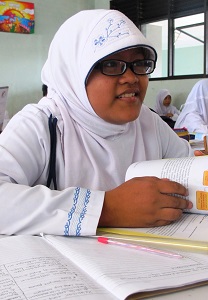Join a powerful, unprecedented alliance for better eye health for all.
Join IAPB-
Choose an alternate language here
Diabetic retinopathy will contribute greatly to the burden of blindness in Indonesia unless steps are taken to screen the millions of Indonesians with diabetes routinely, and provide treatment to those identified with diabetic retinopathy. With funds from Standard Chartered Bank through its Seeing is Believing Programme, Helen Keller International (HKI) has helped to establish diabetic retinopathy screening and treatment centres in three tertiary hospitals in Jakarta, Jogjakarta, and Bandung.
Through the implementation of these programmes, and the implementation of the new government insurance scheme, HKI learned that many people with diabetes in Jakarta will access their routine care at the primary health centres and will never be seen for ophthalmology services at the tertiary hospital unless they have advanced diabetic disease.
 Following a review of the data held with key ophthalmologists at the tertiary hospital in Jakarta, HKI advocated for assessing if screening people with diabetes at the primary health centres would increase uptake of treatment services.
Following a review of the data held with key ophthalmologists at the tertiary hospital in Jakarta, HKI advocated for assessing if screening people with diabetes at the primary health centres would increase uptake of treatment services.
HKI and the Indonesian ophthalmologists at the tertiary hospital in Jakarta are now partnering with each other on a research project to assess uptake of treatment for diabetic retinopathy based in primary health centre screening for diabetic retinopathy. Although the final results will not be collected until June 2015, the preliminary results from three primary health centres has provided evidence of a significant number of people who require treatment for their diabetic retinopathy treatment.
In addition, many of these people with diabetes require treatment for other eye conditions including cataracts. These people may not have been reached in time for referrals for treatment otherwise.
HKI intends to work with key stakeholders to develop and assess new models for service delivery for diabetic retinopathy in Indonesia to reduce the burden of blindness. With as many as four million Indonesians afflicted with diabetes currently, screening, treating, and educating Indonesian people with diabetes will be very important in the coming years.
